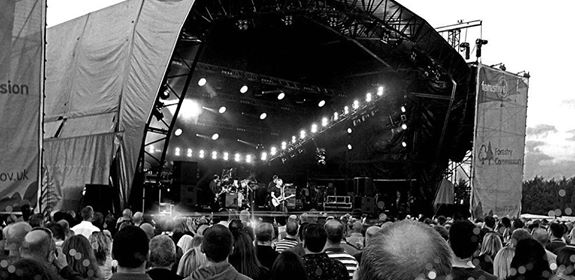The show must go on: will you return to concerts in autumn?
It’s hard to believe that we’re already over halfway through the dystopian reality that is 2020. Yet here we are, with the government desperately shoe-horning ideas of normality back into society. One such semblance of apparent ‘normality’ is the return of concerts which, if held outdoors to socially distanced audiences, have had the go-ahead from July 11 by Culture Secretary Oliver Dowden – indoor concerts may return from August 1. This, along with new guidelines set in place on the 23rd July, have been met with sighs of relief by musicians and performers alike. The show must go on, albeit changed forever.
Music provides an escape from the trials of the world. It’s needed now more than ever
My instinct is to be both glad and excited at the prospect of gigs returning to the UK. On the whole, there was a feeling of utter despondency within the music industry during this pandemic. Online gigs through IGTV or Facebook live are brilliant – if you have the following. For most small artists, this temporary solution simply won’t provide the conditions in which to earn a decent salary.
From a more selfish point of view, I miss gigs. I miss the intimacy between the artist, the song, and me. There’s an emotion that stirs inside of you at a live concert that you can’t feel through earphones or at an online show. Will I ever get to experience that again? Of course I will – but it’s likely to be months before that same euphoria grips me.
We’ll see hugely damaging long-term effects on the music industry such as increased ticket prices and side-lining small acts
Long before we get back to enjoying concerts like before, people must remember that it won’t be the same experience upon their return. Indeed, the government also need to recognise this and realise that reopening does not result in normality, especially for venues. In a recent interview with The Times, critically acclaimed director Sam Mendes said, “the moment you reopen you’re pouring money down the drain”. While he may be speaking from a theatre, perspective, his comment is easily applicable to the arts as a whole.
The new government guidelines for performances in England specifically mention social distancing and reduced capacity. Venues simply will not be able to operate profitably given the current guidelines and circumstances. If the funding dries up when the lights turn on, we’ll see hugely damaging long-term effects on the music industry such as increased ticket prices and side-lining small acts for guaranteed profit.
We may see bands and artists put down their instruments for the foreseeable future
Venues aside, now to focus on musicians. A survey conducted in May 2020 found that UK members of the Musicians Union lost a total of £21million in work opportunities since lockdown began on the 23rd March. This astronomical loss in such a short space of time is not without its repercussions. The larger artists can weather the storm with streaming income and album sales. Smaller acts have to bear the brunt of the virus and we may see bands and artists put down their instruments for the foreseeable future.
However, it’s not all doom and gloom. The government relief package has provided some safety net for performers and venues. Darren Henley, CEO of the English Arts Council, has also re-opened Arts Council England National Lottery Project Grants with a strong focus on supporting freelancers and artists. But this cannot continue forever.
Music provides an escape from the trials of the world. It’s needed now more than ever. Would I attend a concert in the coming months? If I believe that the safety measures in place are sufficient then absolutely. E-tickets, temperature testing, masks and sanitiser at the doors will help keep us safe. Continued government support will help keep the venues up-and-running. A combination of the two will help keep our artists in work and maybe, just maybe, rescue the industry from the perils of an uncertain post-corona landscape.

Comments